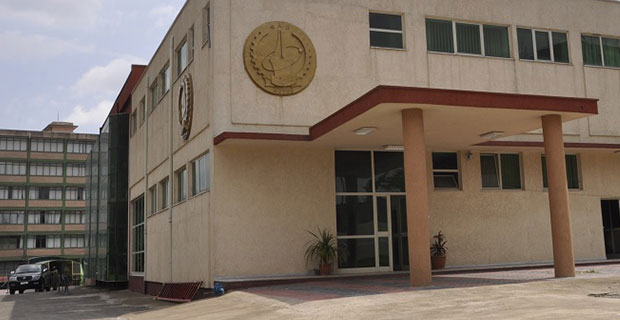
Addis Fortune | May 07,2022
Nearly half of customs clearing agents operating in the country have their permits suspended by the Ethiopian Customs Commission (ECC), enforcing compliance with a directive it issued two years ago.
The temporary suspension of 482 clearing agents was made last week, tightening requirements that transitors conduct business with at least one professional other than themselves, while companies are required to hire a minimum of two.
A little over 1,000 customs clearing agents are registered, working on import and export customs declarations and facilitating the payment of import duties, VAT and excise tax. Individual agents and companies also have to present rental agreements authenticated by the Documents Authentication & Registration Service.
The requirements are more relaxed than the previous rules, says Filagot Bedane, legal advisor for the customs compliance division at the Commission.
The preceding directive compels individual transitors to hire at least three professionals, though never enforced. For permit renewal, individual agents and companies have to register at the Ministry of Trade & Regional Integration (MoTRI) and acquire trade licenses. Two years ago, the Ministry significantly reduced the types of businesses required to present certificates of competency from various federal regulatory bodies to acquire a trade license.
Previously, the requirements applied to 52 ventures, including the customs clearing business, but that number has been lowered to 10.
Most recently, the Commission called clearing agents to renew their permits on November 22 last year, almost three months past the designated renewal period, citing security issues in the country that resulted in the closure of its branches.
“Two of our branch offices in the Amhara and Tigray regions have been closed,” said Filagot. “The one in Tigray remains closed."
The Commission runs 16 branch offices and employs close to 8,000.
Agents can also renew their permits within a month after the deadline though charged penalties for doing so. Data from the Commission shows 57 clearing agents had registered in January after paying the fine. That brought the total number of agents and companies renewed permits to a little above 600.
The Ethiopian Customs Clearing Agents Professional Association, comprising over 350 customs clearing agents and companies, pleaded with the Commission to loosen some of the requirements by amending the two-year-old directive governing the registration and licensing of customs agents. The lobby group claims its members cannot afford to hire more staff, especially now that the import-export business has declined. According to industry players, the gross monthly salary of customs clearing agents is between 20,000 and 30,000 Br.
The Commission declined the Association’s requests.
"We've provided them with ample time," said Filagot. "It's time to enforce the directive fully."
Yohannes Hailemairmam has worked as transitor for more than 15 years. He is among those that have had their permits suspended. Yohannes says he plans not to renew it unless the authorities loosen the requirements.
"I can't afford to pay for another agent," Yohannes told Fortune. “I'm unable to pay rent, let alone hire an extra hand.”
Another requirement for renewing customs clearing permits is a valid rental agreement.
Yeshitela Tamiru has not renewed because he could not present a valid rental agreement. His landlord is out of the country.
“He won't be back any time soon,” said Yeshitela.
Many customs clearing agents like Yohannes and Yeshitela remain stumped on how to solve their problems. However, the story is different for others who have renewed their permits in time.
A transitor who requested anonymity said her renewal process was much easier as she could hire a professional.
"I'm aware that it can be tough for others as the business is slow these days," she said. "The lives of many depend on it."
Mekonnen Bogale (PhD), who has been lecturing on logistics and supply chain management for the last 16 years at Jimma University, believes the suspension will impact the already sluggish logistics sector.
“It's barely functional as it is,” said Mekonnen.
Ethiopia has poor logistics practices and lacks coordination for goods transported. In 2019, its ranking on the World Bank's logistics performance index went up three spots to the 131st. The average time for shipments to reach their destination stands at around four months, an extensive period for a country whose economy is highly dependent on imports.
“When something out of the ordinary happens in the logistics sector, the disturbance is felt by everyone,” said Mekonnen.
Filagot argues the suspension will have little to no repercussions on clearance work as more agents are under training.
“More than half of clearing agents have already renewed their licenses," he told Fortune. "This will have little effect."
There is still hope for clearing agents like Yohannes and Yeshitela.
Although the renewal period has passed, transitors whose suspended permits have been granted a three-month grace period before their permits are permanently revoked.
PUBLISHED ON
Feb 19,2022 [ VOL
22 , NO
1138]

Addis Fortune | May 07,2022

Fineline | Feb 02,2019

Life Matters | Dec 19,2020

Fortune News | Dec 29,2018

Fortune News | Aug 27,2022

Fortune News | Mar 26,2022

Radar | May 04,2024

Fortune News | Jun 26,2021

Radar | Jan 19,2019

Fortune News | Nov 10,2024

Dec 22 , 2024 . By TIZITA SHEWAFERAW
Charged with transforming colossal state-owned enterprises into modern and competitiv...

Aug 18 , 2024 . By AKSAH ITALO
Although predictable Yonas Zerihun's job in the ride-hailing service is not immune to...

Jul 28 , 2024 . By TIZITA SHEWAFERAW
Unhabitual, perhaps too many, Samuel Gebreyohannes, 38, used to occasionally enjoy a couple of beers at breakfast. However, he recently swit...

Jul 13 , 2024 . By AKSAH ITALO
Investors who rely on tractors, trucks, and field vehicles for commuting, transporting commodities, and f...

Jun 28 , 2025
Meseret Damtie, the assertive auditor general, has never been shy about naming names...

Jun 21 , 2025
A well-worn adage says, “Budget is not destiny, but it is direction.” Examining t...

Jun 14 , 2025
Yet again, the Horn of Africa is bracing for trouble. A region already frayed by wars...

Jun 7 , 2025
Few promises shine brighter in Addis Abeba than the pledge of a roof for every family...